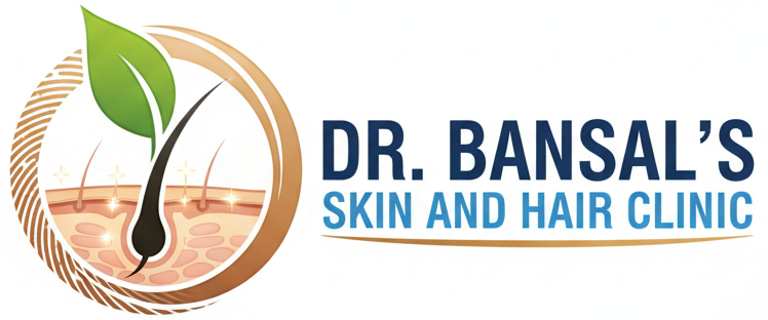Rosacea Treatment In Indore
Dr. Bansal's Skin Clinic, Indore
It is a chronic inflammation of the skin, mainly of the facial area, characterized by redness, flushing, and visibility of blood vessels, and at times small, acne-like bumps.
It is not contagious, and its exact cause is unknown, but it is linked to:
Overactive immune response
Abnormal blood vessels
Genetic factors
Sensitivity to environmental triggers
Rosacea tends to be more common in fair-skinned adults, especially women between the ages of 30-60, but men may have more severe symptoms.
Description / Symptoms
Common signs and symptoms include:
Persistent facial redness on the cheeks, nose, chin, and forehead
Flushing or blushing easily
Small red bumps or pus-filled pimples may appear, similar to acne.
Visible tiny blood vessels on the skin (telangiectasia)
Burning or stinging sensation
Dry, sensitive skin
In severe cases, thickened skin on the nose (rhinophyma)
Eye irritation (ocular rosacea): red, dry, or watery eyes
Treatment of Rosacea
There is no permanent cure, although treatment does help to reduce symptoms and redness and prevent flare-ups.
1. General Skincare and Lifestyle
Cleanse with mild soaps, avoiding harsh soaps or scrubbing.
Use sunscreen daily: SPF 30 or higher.
Avoid triggers such as:
Hot drinks, spicy food, and alcohol
Extreme heat or cold
Stress or emotional upset
Sun exposure
Regularly keep the skin barrier protected by moisturizing.
Avoid using steroid creams on the face unless prescribed.
2. Topical (Skin) Treatments
Used for mild to moderate rosacea:
Metronidazole gel or cream: Reduces redness and inflammation.
Azelaic acid gel acts to reduce bumps and swelling.
Ivermectin cream: This is effective against skin mites, Demodex, which can exacerbate rosacea.
Brimonidine or Oxymetazoline gel temporarily reduces redness by constricting blood vessels.
3. Oral Medications
Used for moderate to severe rosacea or when topical treatments fail:
Antibiotics (Doxycycline, Minocycline, Tetracycline) - reduce inflammation, not just bacteria.
Isotretinoin - for severe, resistant rosacea, under strict medical supervision.
4. Procedural Treatments
For persistent redness, visible veins, or thickened skin:
Laser therapy, either pulsed dye or Nd: YAG laser, reduces redness and broken blood vessels.
Intense Pulsed Light – helps to fade redness.
Surgery or laser resurfacing for thickened skin on your nose (rhinophyma)
Prevention and Self-Care
To prevent flare-ups:
Identify and avoid triggers: keep a diary of foods, weather, or activities that might contribute to IBS.
Protect the skin from the sun at all times.
Use fragrance-free, mild, non-irritating skin care.
Avoid alcohol-based or exfoliating products.
Manage stress through relaxation techniques.
Follow your dermatologist's instructions regularly.
⚠️ Important Notes
Rosacea is a chronic and recurring skin condition; symptoms may be well-controlled with appropriate care. Early treatment prevents worsening and thickening of the skin. Long-term management requires consistent skin protection and the avoidance of triggers.
Care
Dr. Shreyas Bansal has over 46 years of experience in promoting hair health and wellness. At Dr. Bansal’s Homeopathy Clinic, located at 2 Manish Bagh, Sapna Sangeeta Road, Indore, we provide personalised care to strengthen your hair, improve scalp health, and restore confidence naturally.
Health Hairs AT
Beauty
+91 9926120111
© 2025. All rights reserved.
